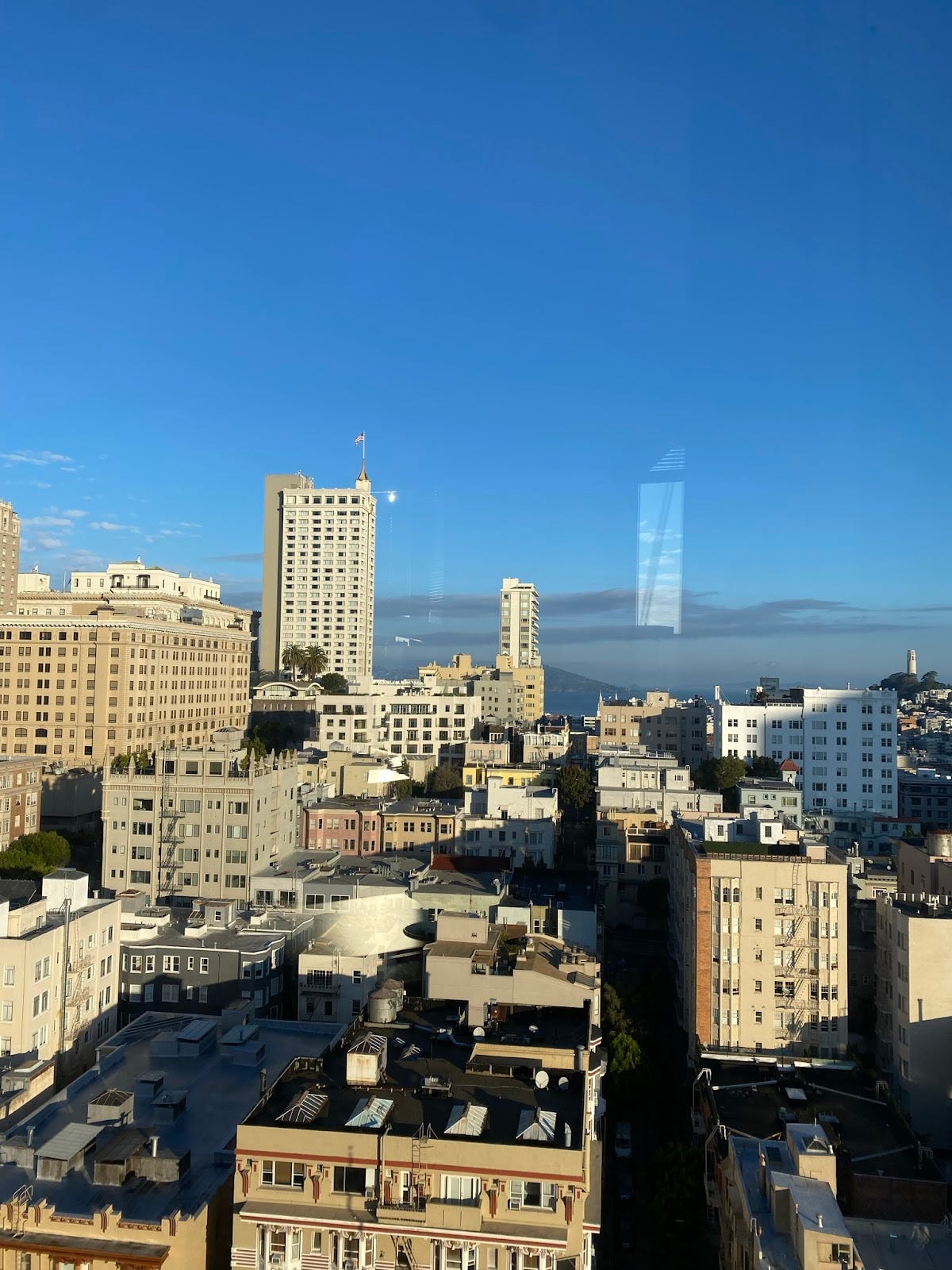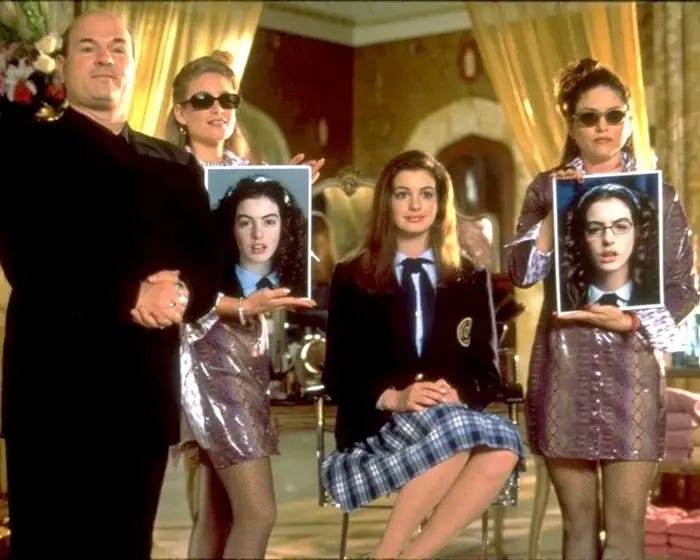My teeth spoke for me before I did, and I hated what they said.
When I was a kid, none of my baby teeth fell out. My adult teeth came in behind them—crooked, stacked, desperate for room. I had to get the baby ones extracted. I think I’m probably the only person who regretted losing theirs. My perfect, straight baby teeth.
I grew up in Irvine, California, where the median household income is $129K, and my public high school parking lot was littered with Porsches and baby Benzes. People came back from summer break with a menagerie of plastic surgery. So you can imagine that something as “basic” as straight teeth was already taken care of. Dental care was assumed. Orthodontia expected. I saw straight teeth everywhere—and I thought that was just the norm.
But I had the misfortune of being an adolescent during the recession. Braces were off the table for me while everyone else got theirs. I learned to smile with my mouth closed. I spoke quietly, lips trained to guard what I didn’t want the world to see. Even now, I sometimes murmur, my voice conditioned by years of hiding.
I don’t remember being mocked. But the fear was always there—that someone would look too closely, decide something about me, and step away.
Honestly, I think that’s part of why I love my friends and chosen family so deeply. I’m fiercely loyal and closely guarded. Even with my oldest friends, I used to brace for the moment someone might ask about my teeth. Most never did. Sensing the shame? Or just being kind? Still, I wonder: would I have been friends with me?
That question—that slow, shameful voice—wasn’t born from vanity. It was structural. It’s what happens when you grow up knowing, without needing to be told, that some parts of your body make you seem less capable, less polished, less deserving.
After college, I got braces. If I could go back, I’d get them sooner. I was 21, working in client-facing roles, trying to be taken seriously by people ten years older. Adult braces felt like a public confession: I hadn’t fixed myself in time.
Eventually, I found Dr. van Bergen, a kind orthodontist in San Francisco who specialized in lingual braces—the kind that go behind your teeth. His office overlooked Coit Tower and the bay, a pocket of stillness in a slinking city. I walked in with shame and a credit card—the modern American problem and solution—ready to wave it all away.

Lingual braces cost over $9,000. I paid for them myself, aggressively saving while putting myself through college. My employer’s dental insurance covered about a thousand dollars, which felt like a gift. I remember the secret, illicit joy of finally having decent insurance. Most of my peers couldn’t relate when I was excitedly poring over my dental plan.
The process was brutal. 3D scans. Custom brackets. A shredded tongue. Crunchy vegetables? Dangerous. Sourdough bread, baked weekly by my partner? Off the table. I broke a wire once and just gave up for a bit.
But within eight months, I could smile—actually smile—with my mouth open. I felt… normal. Seen. Real.

And slowly, things shifted. I got promoted. Made more friends. Settled into post-grad life. Got laid off. Started building Whimsy. I danced, biked, lived. I met people who never knew the older version of me.
But this isn’t a Disney Channel Original Movie. Fixing my teeth didn’t fix my life. Fixing my relationship with myself—helped along by a developing frontal lobe and a slowly reopening world (yes, a lot of this happened during COVID)—made things better.
I accomplished plenty before my teeth were straight. But the constant, grueling effort of hiding my teeth and worrying what people say is a welcome weight off my back. There is so much space for new energy and ideas (and perhaps even new insecurities..) where there was once so much pain and load in my brain.
Of course, I didn’t get braces just to look good. Orthodontia has medical benefits. Straight teeth are easier to floss. Lower risk of gum disease. Better bite alignment. My molars used to crush my bicuspids, eroding the enamel. I’ve had four root canals. You probably haven’t even had one.
But let’s be honest—dental health is not what drives most people to get braces.
We get braces because straight teeth confer social power. Studies show that people with straight teeth are seen as more intelligent, more capable, more trustworthy. According to Kelton Global, Americans are more likely to judge someone with straight teeth as employable—even with identical resumes.
This isn’t just about beauty. It’s about credibility.
Dental care is one of America’s quietest class systems. Over 68 million adults don’t have dental insurance. Medicaid technically includes dental benefits, but many states slash them. Orthodontia? Typically not covered. Medicare, which serves 68 million seniors, doesn’t cover routine dental at all. Meanwhile, government proposals are targeting $880 billion in cuts to Medicaid and Medicare. Dental care will likely be one of the first things on the chopping block.
Poor dental health is directly linked to brain disease, heart disease, and diabetes. This should be a national emergency. Instead, we have people like RFK Jr. pushing to remove fluoride from public water—even though the CDC found fluoridation reduced tooth decay by 25%.
Meanwhile, the cultural bar keeps rising. Veneers are everywhere. The Hollywood smile—bright white, uniformly enormous—has become its own aesthetic, visible across every prestige drama and reality show, blinding viewers with an albedo effect of 100%. There’s even a mini-backlash toward “natural” teeth—though, of course, that just means expensive dental work that looks effortless.
When I was a kid, I used to fantasize about getting veneers. It seemed like the easy way out. Now I realize, lingual braces actually did that.
Usually when I told someone I had lingual braces, their eyes widened.
“Can I see them?” they said, leaning in, inviting me to open my mouth and say ahh.
I’d laugh: “You gotta buy me dinner first. And bake me sourdough bread.” (Hey-o. Callback.)
Then, they inevitably asked why I didn’t just get regular braces.
Me: “I didn’t want people to see them.”
Them: “Yeah, they look kind of weird on adults.” Laugh.
Me: Laugh. Cringe.
Because I knew what I was doing. I was performing. Reaffirming my place in the club—the people who don’t have to think about their smiles anymore.
But the truth is, I belonged all along. We all do.
Sometimes I wonder what life would’ve been like if I’d had straight teeth earlier. Maybe the shame made other parts of me stronger. But when I look at old photos now, I just feel a strange, tender sadness. Like seeing an ex-best friend from across the street. I don’t feel like I abandoned her. I want to hug her. Tell her that after her teeth moved into place, she let go of so much and settled more into herself.
Straight teeth are treated like a baseline. Like a neutral. But they’re not neutral—they’re loaded. They carry stories of class, access, and the kind of polish we quietly expect from “serious” people.
So the next time you see someone with misaligned teeth, pause before you judge. After all, when’s the last time you wore your retainer?
thank you to the friends & folks who read early versions of this piece and held it very closely.






I had braces when I was in high school. My dentist in China then DID NOT tell me to wear braces forever, so I did not. And of course, my teeth shifted in my twenties, then I had to do Invisalign for the last two years! Last month, I was finally done! I will be wearing my retainer forever this time around!
Wow. Beautifully written. Thank you for sharing!